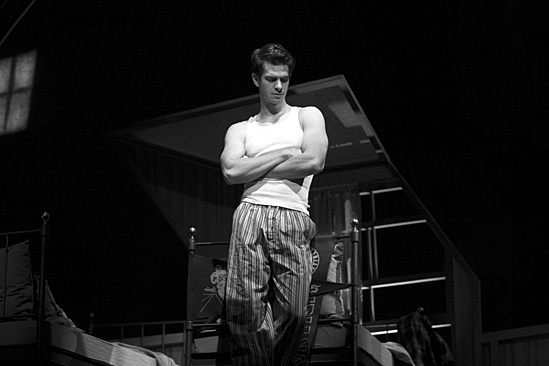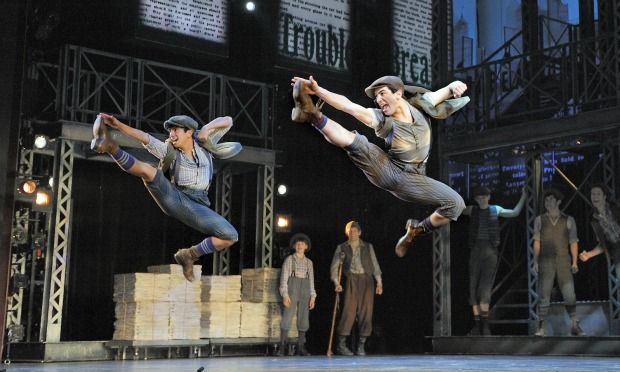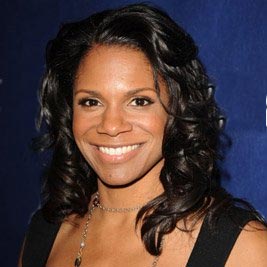Before the Tony Awards nominations are announced tomorrow
morning, I thought I would compile a list of my predictions for the eventual
nominees. While I certainly *hope* that
you take the time to read all of my Tony Watch articles (the latest of which
can be found here) on this same subject, this should provide an easy frame of
reference for those of you who haven’t gotten to all of them yet.
Plus, it’s nice to take one final look back now that all the
shows have opened and we can put everything in perspective. And having an official list will make it
easier to see how accurate my predictions actually are. So here are my picks for all the major Tony
categories, along with a Runner-Up that I could see knocking one of my nominees
out of the running.
 |
| Andrew Garfield in Death of a Salesman |
Best Featured Actor in a Play
Andrew Garfield, Death
of a SalesmanChristian Borle, Peter and the Starcatcher
Jeremy Shamos, Clybourne Park
Michael Esper, The Lyons
Thomas Sadoski, Other Desert Cities
Runner-Up: Dick Latessa, The Lyons
Best Featured Actress in a Play
Angela Lansbury, The
Best Man
Celia Keenan-Bolger, Peter
and the Starcatcher
Condola Rashad, Stick
Fly
Judith Light, Other
Desert Cities
Linda Edmond, Death
of a Salesman
Runner-Up: Christina Kirk, Clybourne Park
 |
| Phillip Boykin in Porgy and Bess |
Best Featured Actor in a Musical
David Alan Grier, Porgy
and Bess
Josh Young, Jesus
Christ Superstar
Michael Cerveris, Evita
Patrick Page, Spider-Man:
Turn Off the Dark
Phillip Boykin, Porgy
and Bess
Runner-Up: Tom Hewitt, Jesus Christ Superstar
Best Featured Actress in a Musical
Da’Vine Joy Randolph, Ghost
Elaine Page, Follies
Jessie Mueller, On
a Clear Day, You Can See Forever
Judy Kaye, Nice
Work If You Can Get It
Melissa van der Schyff, Bonnie and Clyde
Runner-Up: Terri White, Follies
 |
| Tracie Bennett in End of the Rainbow |
Best Actor in a Play
Alan Rickman, SeminarJames Corden, One Man, Two Guvnors
James Earl Jones, The Best Man
Phillip Seymour Hoffman, Death of a Salesman
Stacy Keach, Other Desert Cities
Runner-Up: Hugh Dancy, Venus in Fur
Best Actress in a Play
Cynthia Nixon, Wit
Linda Lavin, The
Lyons
Nina Arianda, Venus
in Fur
Stockard Channing, Other
Desert Cities
Tracie Bennett, End
of the Rainbow
Runner-Up: Jennifer Lim, Chinglish
 |
| Jan Maxwell in Follies |
Danny Burstein, Follies
Jeremy Jordan, Newsies/Bonnie and Clyde
Norm Lewis, Porgy
and Bess
Rob Raines, Follies
Steve Kazee, Once
Runner-Up: Raul Esparza, Leap of Faith
Best Actress in a Musical
Audra McDonald, Porgy
and Bess
Bernadette Peters, Follies
Cristin Milioti, Once
Jan Maxwell, Follies
Kelli O’Hara, Nice
Work If You Can Get It
Runner-Up: Elena Roger, Evita
 |
| Elaine Paige and the boys of Follies |
The Best Man
Death of a Salesman
A Streetcar Named Desire
Wit
Runner-Up: Master Class
Best Revival of a Musical
Evita
Follies
Jesus Christ
Superstar
Porgy and Bess
Runner-Up: Godspell
 |
| The cast of Newsies |
Best Play
Clybourne ParkOther Desert Cities
Peter and the Starcatcher
Venus in Fur
Runner-Up: The Lyons
Best Musical
Newsies
Nice Work If You
Can Get It
Once
Spider-Man: Turn
Off the Dark
Runner-Up: Bonnie
and Clyde
Check back tomorrow morning to see how I did!








